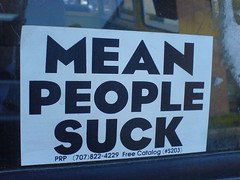 With that title I probably violated several things that I recommend doing (act professional, be careful of what you say and how you say it, etc.).
With that title I probably violated several things that I recommend doing (act professional, be careful of what you say and how you say it, etc.).
I stumbled on a blog that was titled “The Stupid Things People Do on LinkedIn”. The poster then proceeded to lash in to people that violated his perception of what LinkedIn should be and how people should behave on it. My first thought was relax it’s not your site. You’re just another member. The second was that did this person realize that their post was part of their online brand.
So there are two points to discuss. The first is about your online brand. The second is about unwritten protocols on LinkedIn that many people may not be aware of.
Your Online Brand
Remember this: Everything you do on LinkedIn (and within the Social Web) either “adds to” or “subtracts from” your online brand. This isn’t some college football board where you can denigrate and abuse fellow posters if you don’t like their view or comment. There are no cute user names to hide behind. On LinkedIn your comments are easily associated with the person behind them, YOU.
I don’t know the person behind the “stupid LinkedIn” post, but I already have an opinion of him. Want to guess whether it’s positive or negative? If this were a person that I was considering connecting to, partnering with, or engaging in their service, I would walk away. There is enough negativity in the world without having to knowingly engage in it or with it.
This may not matter to him. But it should to the average LI user. When you ask or answer a question, post a discussion or news article in a group, add a blog to your profile, and how you respond to those who attempt to connect all contribute to your brand.
Consider this. You receive a connection invitation from John who works for an advertising agency. You don’t know John so you mark the Invitation “I don’t know this user” (when you could have simply Archived It). A couple of weeks later you connect to Bill who runs a graphics firm that you want to develop as a client. You get an appointment and everything looks good. Later John, who happens to engage Bill’s firm for his advertising agency notices that you are connected to Bill. In their next conversation, John mentions that he saw that you and Bill were connected and mentions that you recently refused his connection invitation. And rather than Archive it you marked it “I don’t know this user”. Now his account has been restricted. Bill thinks “that wasn’t a nice thing to do to John” and calls you to say they’ve decided to go in a different direction.
Is this an extreme story? Yes. Is it a possibility? Yes. Your actions carry implications…some positive and some potentially negative. Act in good faith and in a neighborly fashion and your brand will benefit.
The Unwritten Protocals
Over time acceptable practices evolve as do unacceptable ones. As a member of LinkedIn you should adhere to the acceptable norms. There aren’t to0 many and most are common sense, that often gets overlooked due to lack of time, imagination, or knowledge. Here are some and I’m sure there are others that I have not thought of or encountered (violated) yet.
1. Never send a canned invitation. Always personalize the invitation.
2. Don’t send out mass invitations. It makes it difficult to personalize the email
3. Don’t send out Mass Canned invitations…see #1 and #2
4. When participating in answers or group discussions do not blatently sell. How you phrase a sales pitch can be seen as spam or an interesting question or post. Which of the two following statements is likely to be viewed as spam?
A. Mortgage rates dropped to 4.5%, call me if you are looking to refinance; or
B. With mortgage rates dropping to 4.5%, how do you determine if it’s a good idea to refinance your loan?
5. Respond to all messages in your inbox. If you don’t want to connect send a brief explanation as to why (see my post: http://linkedintuition.com/blog/no-thanks-the-right-way ) . Don’t feel comfortable providing a recommendation or passing on an introduction reply with why.
6. Don’t ask for recommendations from people who don’t know you very well. Recommendations should be appropriate and sincere. It’s rude to ask when there’s no basis for one.
7. Don’t expect everone to have the same approach that you do on LinkedIn. Some are open networkers and some are closed networkers. Each person decides what works best for them. No one has a monopoly on the right way.
8. If you do not want to connect, “Archive” the invitation. Don’t select “I don’t know this user”. Doing so gains you nothing and it can negatively impact another member. Is it such an evil thing to want to connect to another that you do not know. Isn’t that what networking is about.
Not everyone will agree with every point that I made. Each person interacts with LinkedIn based on their expectations and beliefs and that’s a good thing. What we should be able to agree on is that acting in a friendly and respectful manner will always do more good than harm.
What do you think?